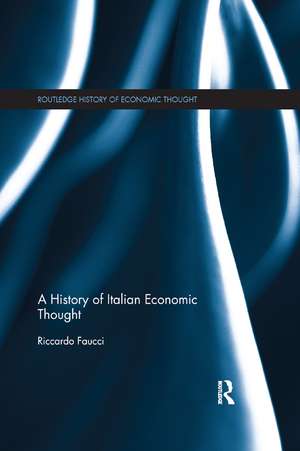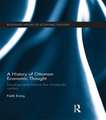A History of Italian Economic Thought: The Routledge History of Economic Thought
Autor Riccardo Fauccien Limba Engleză Paperback – 12 dec 2019
Within this book it illustrates the Restoration period (1815-48). There was a slowdown of the economists' engagement, due to an adverse political situation, that prompted the economists to prefer less dangerous subjects, such as the relationship between economics, morals, and law (the main interpreter of this attitude was Romagnosi). After 1848, however, in parallel with the Risorgimento cultural climate, a new vision of the economists' task was eventually manifested. Between economics and political Liberalism a sort of alliance was established, whose prophet was F. Ferrara. While the Historical school of economics of German origin played a minor role, Pure Economics (1890-1940 approx.) had a considerable success, as regards both economic equilibrium and the theory of public finance. Consequently, the introduction of Keynes's ideas was rather troubled. Instead, Hayek had an immediate success.
This book concludes with a chapter devoted to the intense relationships between economic theories, economic programmes and political action after 1945. Here, the Sraffa debate played an important role in stimulating Italian economists to a r
Preț: 259.98 lei
Preț vechi: 326.49 lei
-20% Nou
Puncte Express: 390
Preț estimativ în valută:
49.75€ • 54.02$ • 41.79£
49.75€ • 54.02$ • 41.79£
Carte tipărită la comandă
Livrare economică 23 aprilie-07 mai
Preluare comenzi: 021 569.72.76
Specificații
ISBN-13: 9780367867027
ISBN-10: 0367867028
Pagini: 280
Dimensiuni: 156 x 234 mm
Greutate: 0.45 kg
Ediția:1
Editura: Taylor & Francis
Colecția Routledge
Seria The Routledge History of Economic Thought
Locul publicării:Oxford, United Kingdom
ISBN-10: 0367867028
Pagini: 280
Dimensiuni: 156 x 234 mm
Greutate: 0.45 kg
Ediția:1
Editura: Taylor & Francis
Colecția Routledge
Seria The Routledge History of Economic Thought
Locul publicării:Oxford, United Kingdom
Public țintă
Postgraduate and UndergraduateCuprins
1. General problems of interpretation 2. Machiavelli to Genovesi 3. The heyday of eighteenth century Italian economics 4. Strengths and weaknesses of the early Ottocento 5. Francesco Ferrara and the economic schools in Italy (1850-1890) 6. Pure economics in Italy (1890-1920) 7. The Post-Pareto generation (1920-45) 8. Post-war and recent decades
Notă biografică
Riccardo Faucci is Full Professor of the History of Economic Thought at the Pisa University, Italy. He is co-editor of History of Economic Ideas.
Recenzii
"I greatly enjoyed the book... In short, volume 13 of this series of national histories is a fine part of an excellent series. It will be enjoyed both by those familiar with much of Italian economics over the ages, and by those who are new to the field." - Peter Groenewegen, History of Economics Review
Descriere
Italy has an incredibly rich tradition in the history of economic thought. In this important new volume, Riccardo Faucci charts the key features of the development of economics in Italy, from around 1500 up to the present day.
















